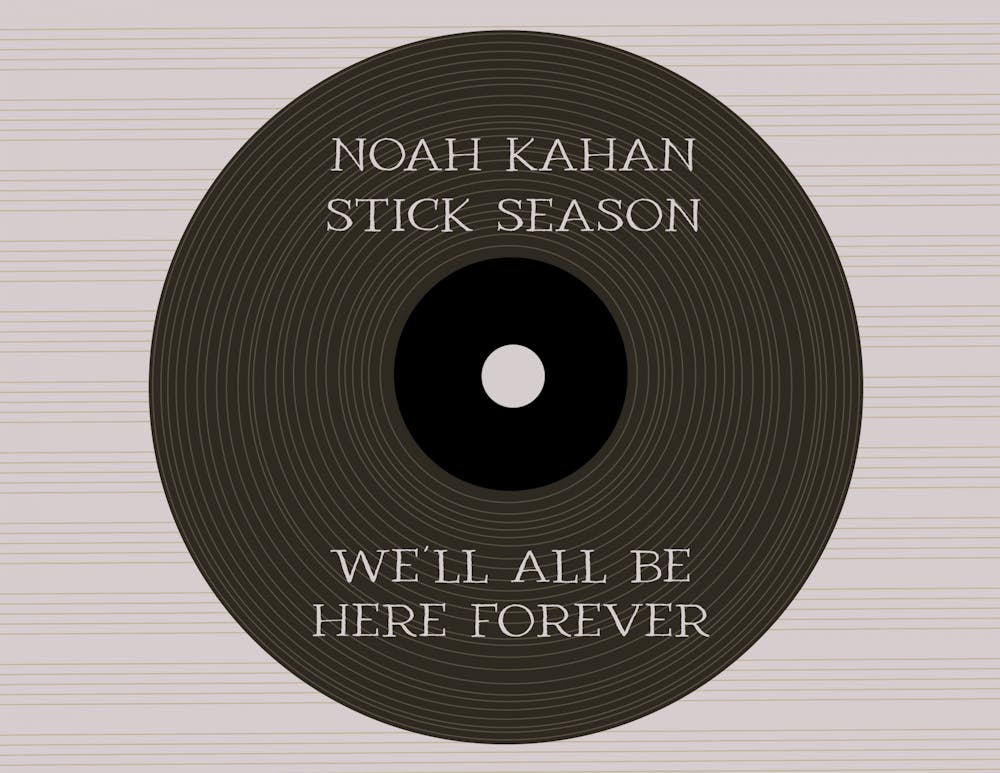Eight months after the massive success of the critically acclaimed “Stick Season,” indie-folk artist Noah Kahan released the deluxe version, entitled “Stick Season (We’ll All Be Here Forever),” with seven more songs and seven more stories of heartache to pull at your heartstrings.
It carries many of the same themes as the rest of his discography, including mental health issues, drug and alcohol abuse, feelings of being stuck in small-town America and watching loved ones move on and away.
A great example of the theme of mental health is “No Complaints,” which carries a self-awareness to it, explaining that Kahan tried to blame his dad and the weather to justify his poor mental health, which he had referenced in prior songs. He then explains that he can’t blame all of his problems on external forces and that some of the issues lie within him, which he blocks out with prescription medications in order to drown out the pain. This unfortunately just takes a different, more numb form.
Mental health is also touched on by the tear-jerking tune “Call Your Mom,” which explains depression and suicidal ideation from a different perspective, an outsider’s perspective. The subject of the song is struggling with thoughts of suicide, and the narrator tries to convince them to stay for any reason, be it religion, love, medications, meditation, fighting or quite literally anything that can convince the person to not take their own life. The song then finishes with the narrator promising to drive all night and call the subject’s mother in order to make them stay.
Another tearjerker is found in the deceptively upbeat “Dial Drunk,” which spins a story that many can relate to: making bad decisions and hoping that someone you no longer know well will finally respond to you. Although not all of us ended up in the exact same scenario that the narrator did, getting arrested for an intoxication-related charge and calling a former loved one in hopes that they will pick up the phone while trying to negotiate with the cops, many of us have reached out or thought about reaching out to a former loved one in hopes that repairs could be made to salvage the relationship.
In comparison, “You’re Gonna Go Far” takes a more bittersweet approach to watching a loved one disappear from your life. Rather than the strained relationship of “Dial Drunk,” “You’re Gonna Go Far” tells the story of someone watching their loved one move away. As much as it hurts to watch them go, the narrator is glad that they are finally being the one to leave their small town and make something of themselves, beautifully calling the departing loved one “the greatest thing we’ve lost.”
But the true masterpiece of the album is in the extended version of “The View Between Villages.” the first version was a beautifully poetic image of a late-night drive to your childhood home, the extended version also uses audio from people describing why they like the small town of Strafford, Vermont, which the singer hails from. Even though most of the album expresses distaste for small-town America, this track repaints a bit of the picture, reminding that while Strafford has its problems, it is still ultimately the home of many of the singer’s loved ones, and the hometown he grew up in, creating a bittersweet feeling surrounding it.
“Stick Season: We’ll All Be Here Forever” delivers on all fronts, pulling at your heartstrings and hitting way too close to home as much as its predecessor did, further cementing Kahan as a rising star on the indie-folk scene.






